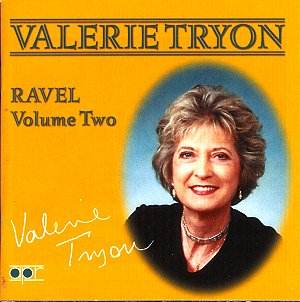This
is volume 2 of a two-disc survey by Valerie Tryon of all Ravel’s
solo piano music. As such it enters a very crowded field, with
formidable competition from Paul Crossley, Jean-Yves Thibaudet,
Anne Queffelec, Louis Lortie and, most recently Angela Hewitt.
I suppose this list points up the two basic ways of approaching
this music; one can be coolly poised, clean-textured and bring
out the classical proportions underlining many of these works
(as with Hewitt and Crossley) or one can adopt an overtly theatrical
style, bringing out the colour and sheer Lisztian drama that is
also there (as very much with Thibaudet and Lortie).
Tryon’s
playing, on the whole, has a cultured, refined feel that puts
it in the first camp, and as most of the pieces on this second
disc respond to this approach, there is little to complain about.
The Valses Nobles are very nicely characterised, with charm,
polish and wit in equal measure. Her fairly steady tempi mean
that some of the wild abandon that makes Thibaudet’s account so
exciting, is missing. But this is only a minus point in certain
waltzes and Tryon clearly sees the bigger picture, with a cumulative
tension building that has its own rewards.
Likewise
Le Tombeau de Couperin is better in some sections than
others, but never less than extremely musical. The opening prelude,
marked vif, misses the last ounce of glitter and sparkle
that others bring, but the fugue and famous menuet
have a beautifully balanced weight of touch that is entirely idiomatic.
The ‘clockwork’ atmosphere of many of the phrases is well judged,
and I like the way the pedal is used, very discreetly and in accord
with her general approach. The short character pieces benefit
also from this sort of cool restraint, with only the delicious
little Menuet antique possibly needing a touch more light
and shade (Hewitt is matchless here).
La
Valse lacks the sort of menace and volcanic edge that suits
Thibaudet to perfection, but what Tryon’s performance lacks in
virtuosic swagger it more than makes up for in subtlety and deft
individual touches. The engineers beautifully capture the piano
tone, and the slightly close balance simply reinforces Tryon’s
intimate brand of pianism. The booklet notes contain nothing directly
about Ravel or the music, instead giving us an in-depth interview
with the artist, whose views are fully borne out by her playing.
It would be interesting to hear how she copes with the greater
physical demands of pieces like Jeux d’eau or Gaspard
on volume 1, but for now this will do very nicely.
Tony
Haywood
